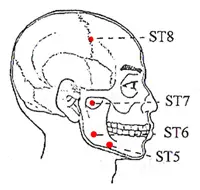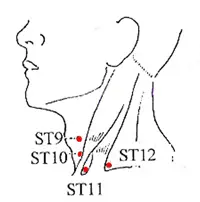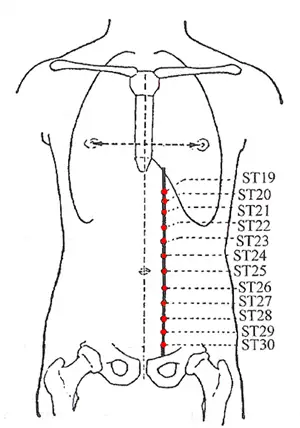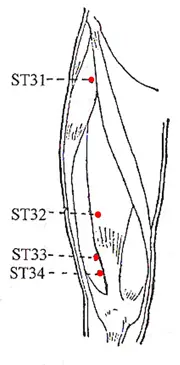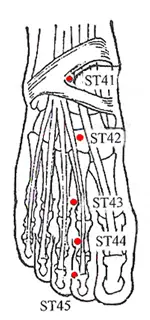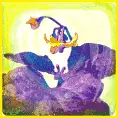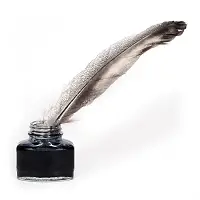The Stomach Meridian
Nourishment -
Physical and Emotional
The stomach meridian is a yang meridian and is paired with the Spleen yin meridian.
It functions with the Spleen Meridian in the assimilation of Qi from food through digestion and absorption.
The stomach meridian’s connection to the stomach and spleen causes a connection between one’s Qi flow and the nourishment they receive. Proper nourishment is necessary to maintain a Qi flow and remain physically and emotionally balanced.
The Stomach Meridian Route or pathway
The stomach meridian is one of the longest meridians containing 45 points and existing throughout the entire body. The stomach meridian starts at ST1, between the lower eyelid and the eye socket, and runs down the face, passing through the gums, down to the chin, and loops up past the front of the ear and up to the forehead.
At ST8, it backtracks along the throat, down across the shoulder, down the ribs, along the stomach, splitting into separate branches with internal branches descending to connect each channel, and then down the leg, passing the outside of the kneecap, and ending at ST45, the outside edge of the second toe.
Stomach Meridian Element:
Earth element with strong nurturing qualities. As an Earth element the stomach meridian focuses on nurturing and satisfying needs in your mind and body. As an Earth element the stomach meridian focuses on nurturing and satisfying needs in your mind and body.
Stomach Meridian Symptoms:
The stomach meridian being imbalanced has negative effects on our body, mind, and digestive systems. If imbalance occurs, there are many physical and emotional symptoms that one may experience.
Stomach Meridian Physical Imbalances:
Malnourishment of the stomach meridian, overactive nerves, as well as
excessive stress and overthinking can all lead to stomach meridian
imbalance. It’s important to nourish the stomach meridian and remain
centered with oneself and emotions in order to maintain meridian
balance.
Physical imbalance symptoms can include: Digestive and
stomach problems - abdominal pain, distension, edema, vomiting, sore
throat, facial paralysis, upper gum toothache, nose bleeding, headaches,
weight problems, appetite changes and abnormal production of stomach
acid.
Stomach Meridian Emotional Imbalances:
Many negative emotions are associated with stomach meridian
imbalance. Stomach meridian emotions can be the cause of an imbalance,
as well as the result of one.
Emotional imbalance symptoms can include: Anxiety, worry, skepticism or doubt, poor confidence, feelings of suspicion or mistrust, instability, confusion, desire to be alone.
When Balanced:
Proper nourishment and a centered mind and emotions will balance the stomach meridian and allow one to feel more grounded and stable.
Balancing causes feelings of peace, relief, concentration, fairness, openness and caring.
Peak Hours: 7-9 am
The peak hours are the time of day that the meridian is most likely to have symptoms of imbalance, which makes this the most effective time for acupuncture.
Chakra: Root Chakra
Foods That Support Stomach Health:
Root Vegetables such as carrots, parsnip, turnips, and all the other types of food that come from the earth.
Stomach Meridian Chinese Medicine
In Traditional Chinese medicine, meridians exist throughout our body and link together to form meridian systems. Meridian systems have channels that form a network for Qi, or vital energy, as well as blood to flow through. This network, which allows Qi to flow through our body, created the connection between Qi and the healing of our bodies.
The connection allows us to use different Chinese medicine techniques that restore our Qi energy flow, to heal and repair our bodies. One of the ways this can be done is through pressure, which allows the practice of acupuncture or acupressure to heal the body. Other methods which involve using needles, cupping, or heat at the meridian points, can help restore this energy as well.
Meridian Charts
NEW!
Body Meridians - Meridian Flows and Meridian Acu-Point Charts
Stomach meridian charts are visuals that can be used to further explain it’s flow and acupuncture points. They show the pathway of the stomach meridian throughout the body and the location of each acu-point.
All the Meridian flows and Acu-points...
Body Meridians Book and Acu-Points Charts
Stomach Meridian Acupuncture and Acupressure
When the flow of Qi is blocked or disrupted, it can cause the physical or emotional imbalances of the stomach meridian. Using the traditional Chinese medicine method of acupuncture or acupressure, the flow can be restored and allow the body to heal.
There are 45 stomach meridian acupoints throughout the body, all of which are located somewhere along the stomach meridian. Each point has a purpose of healing a different area of the body and can help relieve pain being experienced.
Stomach Meridian Sedating Points
Many acupoints along the stomach meridian are stomach meridian sedating points, which heal the body and balance the Qi flow by releasing energy. Other points are strengthening points which help by attracting and adding energy to the body.
Stomach Meridian Acu-Points
Below are the 45 points along the stomach meridian.
ST1 – Chengqi - Redness, swelling and pain of the eye, night blindness, twitching of the eyelids
ST2 – Sibai - Myopia, corneal opacity, redness, itching and pain of the eye, twitching of the eyelids, facial paralysis, headache, vertigo
ST3 – Juliao - Facial paralysis, twitching of the eyelids, epistaxis, toothache, swelling of the lips and cheeks
ST4 – Dicang - Twitching of the eyelids, twitching of the corner of the mouth, facial distortion, drooling
ST5 – Swelling of the cheek, toothache
ST6 – Jiache - Lockjaw, Swelling of the cheek, toothache and swelling of cheeks
ST7 – Xiaguan - Deafness, tinnitus, nasal congestion, toothache, lockjaw, facial distortion and swelling and pain of the cheeks
ST8 – Touwei - Headache, vertigo, twitching of the eyelids
ST19 – ST21 – Stomach ache, Gastric pain, vomiting, poor appetite, abdominal distention, diarrhea
ST22 – Abdominal distention and pain, borborygmus, diarrhea
ST23 – Psychosis, irritability, protruding tongue
ST24 – Manic psychosis, vomiting, protruding tongue, stiff tongue
ST25 – Tianshu - Abdominal distention, borborygmus, pain around the umbilicus, constipation, diarrhea, dysentery, irregular menstruation
ST26 – Abdominal pain, hernia
ST27 – Lower abdominal distention and pain
ST28 – Shuidao - Lower abdominal distention, infertility, hernia
ST29 – Guilai - Irregular menstruation, hernia, abdominal pain, hernia, prolapse of the uterus
ST30 – Qichong - Hernia, irregular menstruation, irritability, impotence
ST31 – Muscular atrophy, weakness, numbness and pain of lower extremities, coldness and pain of the lower back and knee
ST32 – Futu - Paralysis or weakness of the lower extremities, coldness and pain of the lower back and knee
ST33 – Coldness and pain of the lower extremities and knee, limitation of the lower extremities, hernia, abdominal distention and pain
ST34 – Liangqiu - Stomach ache, Acute gastric pain, swelling and pain of the knee joint, weakness of the lower extremities
ST35 – Dubi - Swelling and pain of the knee joint
ST36 – Gastric pain, vomiting, dysphagia, abdominal distention, borborygmus, diarrhea, indigestion, dysentery, constipation, abdominal pain, palpitation, shortness of breath, poor appetite, lassitude, dizziness, insomnia, cough and asthma, pain in the knee joint
ST37 – Shangjuxu - Abdominal pain, borborygmus, constipation, diarrhea, muscular atrophy, weakness, numbness and pain of the lower extremities
ST38 – Tiaokou - Coldness, pain, and weakness of the shoulder, muscular atrophy, weakness, numbness and pain of the lower extremities, swelling of the foot, spasm
ST39 – Xiajuxu - Lower abdominal pain, pain in the lower back referring to pain in the testicles, diarrhea, dysentery, muscular atrophy, weakness, numbness and pain of the lower extremities
ST40 – Fenglong - Vomiting, constipation, cough, excessive phlegm, asthma, psychosis, headache, dizziness, paralysis or weakness of the lower extremities
ST41 – Jiexi - Pain of the ankle joint, weakness and muscular atrophy, numbness and pain of the lower extremities, headache, dizziness, manic psychosis, abdominal distention, constipation
ST42 – Chongyang - Gastric pain, abdominal distention, swelling and pain of the dorsum of the foot, swelling of the face, toothache, deviation of the mouth and eye
ST43 – Xiangu - Myasthenia of the upper eyelid and difficulty opening the eyes, facial and general edema, swelling and pain of the dorsum of the foot, abdominal pain
ST44 – Neiting - Toothache, sore throat, dry mouth, epistaxis, abdominal distention, constipation, gastric pain, swelling and pain of the dorsum of the foot, dysentry, diarrhea
ST45 – Lidui - Swelling of the face, toothache, sore throat, epistaxis, nightmare, manic psychosis
Sources:
https://www.cancer.gov/publications/dictionaries/cancer-terms/def/chinese-meridian-theory
https://www.ncbi.nlm.nih.gov
Related Pages:
Overview
Techniques
* Meridian Flushing and Tracing
The Meridians
* Spleen Meridian* The Small Intestine Meridian
Related Pages
From 'Stomach Meridian' back to 'Home Page'





